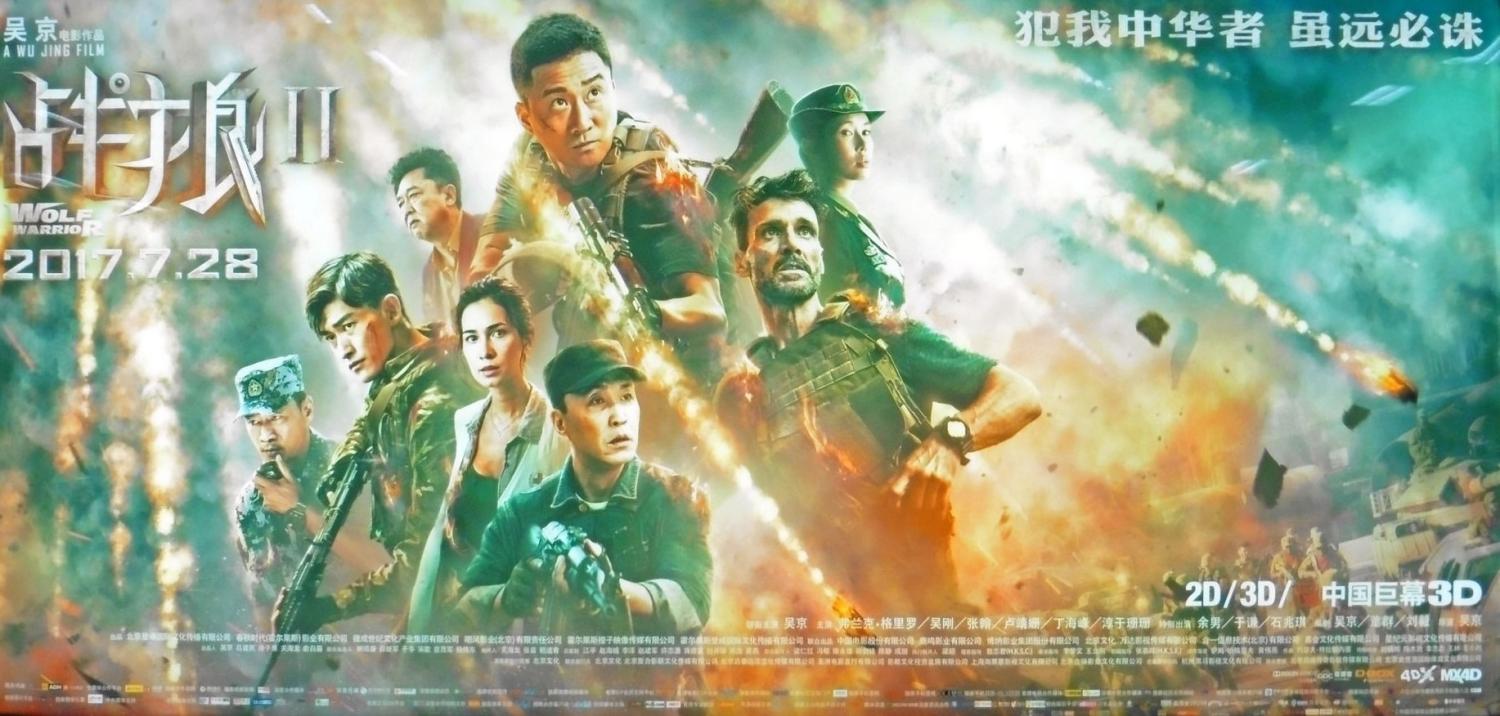Wolf Warrior II (WWII) has stormed the Chinese box office, becoming the highest-grossing film ever in China. After only 12 days in cinemas the film had taken 3.4 billion RMB, surpassing the previous record of 3.39 billion RMB held by the film The Mermaid.
The film, that stars kung fu expert Wu Jing as a former Chinese Special Forces soldier who fights villainous American mercenaries to free Chinese hostages, has proved popular for various reasons. These include: the high quality action scenes (on par with Western action sequences); a dearth of competition at the box office (helped by the Chinese film regulator’s tight control over the film distribution); and the presence of home-grown hero in kung fu expert Wu Jing who not only takes on the star role of Leng Feng but also directed the film.
But the greatest reason for the film’s success is its patriotic messaging. This is found everywhere from the tagline - ‘anyone who attacks China will be punished no matter where they are’ - to the rousing final image of a Chinese passport with the message that the Chinese government will protect its citizens anywhere in the world.
In and of itself, this is hardly news. Rising nationalism has been a noticeable trend for some, increasing in line with China’s ascent on the world stage. A more interesting takeaway from this film is what it says about the emergence of Chinese exceptionalism: China is now perceived as the ascendant power; the US a power in decline.
WWII is an example of the increasingly widespread view in China that it has thrown off the shackles of a century of humiliation and emerged as a power equal to - if not better than - its Western counterparts.
As if to symbolise this newfound place in the world, the ‘baddie’ in WWII is the buff Frank Grillo who plays the role of an American mercenary Big Daddy. While Leng Feng is given cool action scenes, Big Daddy is left to look evil while issuing pithy, one line commands. In thinly veiled symbolism, Leng Feng rescues the trapped Chinese nationals trapped in an unnamed African country while single handedly defeating the bloodthirsty Americans.
Given the growing belief in China that it will soon unseat the US as the world's superpower, is it any wonder that Chinese fiction is now starting to reflect this perceived geostrategic shift?
Conversely, given the relative decline of the US, Hollywood films no longer feel confident in depicting Chinese villains.
During the Cold War and at the peak of US global supremacy, Hollywood films were quite happy to cast their bad guys as Russians. Russia is still seen as a threat to the US (latest manifestations include tampering in the 2016 elections and suspected influence in the Trump administration). Russian villains still show up on our screens, even though Russia is no longer viewed as the existential threat it was during the Cold War.
When it comes to Chinese villains, however, one must go back to the 1930s and 1940s and the films of Fu Manchu to find examples. Apart from a juvenile caricature of a Chinese baddie in The Hangover, contemporary films are loathe to depict their bad guys as Chinese.
Take the 2012 film Red Dawn 2 for example. When MGM decided to remake the 1984 film, Chinese were written into the script as the villains. But distributors later got cold feet and digitally erased every last trace of China from the film, substituting North Korea instead. There are numerous other examples of Hollywood films changing aspects of their plot or characters to succeed in China.
This could be attributed simply to a desire to increase profits through access to the lucrative Chinese film market, worth close to $US10 billion. But could you imagine 1980s America giving in to Russian pressure to alter its depiction of Soviet villains?
The reluctance of US filmmakers to portray Chinese baddies is evidence of US cognisance of China’s more assertive role on the global stage. It’s no coincidence WWII was released just days before the 90th anniversary of the founding of the People’s Liberation Army (PLA), or days after the opening of the China’s first overseas military base in Djibouti. Both underline China’s growing international stature.
The depiction of China’s real-life geostrategic rivals, the Americans, in WWII, and converse reservations in the US about depicting Chinese villains in its own films is possibly a reflection of China’s burgeoning strength and the decline of US influence in relation to China. The success of such a nationalistic film points to the desire of Chinese citizens to watch and read stories that reflect this new reality.
Photo courtesy of Flickr user Chris

